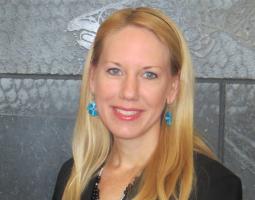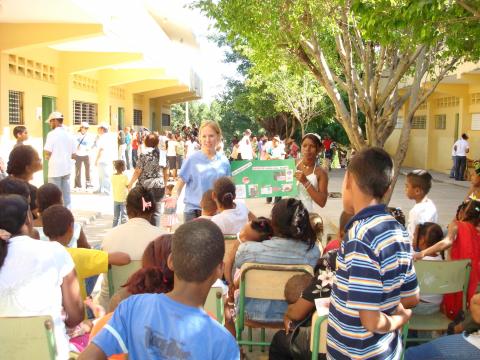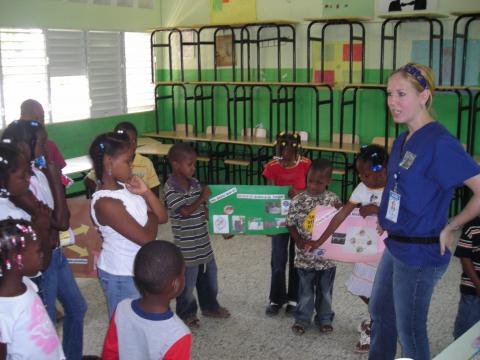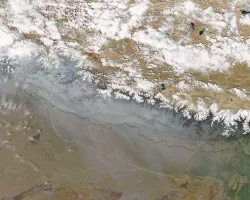Helena Chapman is an associate program manager for the Earth Applied Sciences' Health and Air Quality Applications program at NASA headquarters in Washington, DC. She also supports the Group on Earth Observations (GEO) Health Community of Practice. As a global network of governments, organizations and observers, it promotes the use of Earth observation data in health decision-making at local, national and international levels.
Chapman is both a physician and has a Ph.D. in public health with a concentration in “One Health,” a concept recognizing the interconnectedness between human, animal and environmental health. Chapman uses her expertise to identify research and programmatic gaps in the field and find innovative solutions. She is speaking on the topic at the American Meteorological Society’s annual meeting, being held in Boston, from January 12-16, 2020.
In a keynote seminar to a group of future public health professionals at her alma mater, the University of Florida College of Public Health and Health Professions, Chapman shared stories of her experiences working with local community members, aiding on-the-ground responses to natural disasters and working across disciplines to lead initiatives that build scientific knowledge and safeguard community health.
Experience 1: Educating Communities on Potential Disease Risks
Early in her public health training, Chapman discovered her passion for working directly with community members in the field. During a 2005 rural community visit in the Dominican Republic, Chapman’s team conducted interviews with community leaders and members on their perceived risk of dengue fever transmission, adherence to recommended prevention strategies and health-seeking behaviors for ill family members. During one interaction with a family, the team noticed a type of plant called a bromeliad in front of the home. With their often rosette-shaped leaves and flowers, these plants can have nooks and crannies that trap water. These stagnant pools of water are often habitats for Aedes aegypti mosquitoes that can transmit the disease. After the respective interview, Chapman recognized this moment as an opportunity to educate community members about their risk of dengue transmission and empower them to engage in proactive behaviors for optimal health and well-being.
These field experiences deepened Chapman’s understanding of the determinants of health that may hinder how community members are able to engage in proactive behaviors that promote health and well-being. She recognized that training in medicine and public health would support her continued passion to improve public health on every scale, from talking to people in their homes, to leading local educational activities, and working with elected officials and other decision-makers on their policy decisions.
Lesson Learned:
“By working directly with community members, you can gain a true understanding of the challenges that they face as well as the specific pathogens or disease conditions that influence health and well-being. Without this information, you will not be able to identify research or programmatic gaps that are the foundation for the development of subsequent community outreach activities.”
Experience 2: Responding to Unexpected Events
As a medical student with public health training, Chapman supported community relief efforts for two natural hazards in two neighboring countries: a tropical storm in the Dominican Republic and an earthquake in Haiti. While working in diverse health care teams, she observed that all health professionals serve distinct roles in these on-the-ground response efforts. After further reflection, Chapman recognized that the comprehensive medical curricula did not provide medical students with early opportunities for formal community interactions and collaborations with fellow students. Mastering these clinical skills is essential for physicians to serve as future leaders and manage emerging health threats that influence population health.
These on-the-ground response efforts provided insight and motivation to develop the non-governmental organization, Organización Dominicana de Estudiantes de Medicina. It fosters health and research collaborations among medical students across the Dominican Republic. Years later, with 10 medical schools in the Dominican Republic, Chapman has observed that medical students have prepared more than 12 national conferences, conducted more than 100 preventive health campaigns and published more than 100 articles in international journals. Chapman says that these collaborations strengthened her resolve to spend her career building connections that benefit public health.
Lesson Learned:
“Expect the unexpected. Each step can lead to new discoveries and reflections. As health leaders, we have to look beyond what is happening and sometimes identify what is not happening. Recognizing gaps in research and in practice, lets us develop innovative solutions to fill in these gaps and apply these approaches to practice.”
Experience 3: Seeking Innovation to Advance Science
Throughout her journey, Chapman has continued to advance her knowledge and skills, which served as a foundation to pursue her next career goals. After her undergraduate studies in the biological sciences, she pursued graduate studies in epidemiology, focusing her research on dengue fever transmission in Cuba, Dominican Republic and Puerto Rico. In order to strengthen her understanding of disease transmission, she initiated her medical education to learn about basic and clinical sciences related to providing patient care as a future clinician. However, as she embraced her clinical training, she was motivated to pursue further research training in “One Health,” focusing on global education and practice. Her dissertation research focused on clinicians’ adherence to infection control practices to reduce tuberculosis transmission in health institutions in the Dominican Republic.
Now, as an associate program manager for the Earth Applied Sciences' Health and Air Quality Applications program, Chapman uses her medical and public health expertise in vector-borne and respiratory diseases and field response efforts to natural hazards as a framework to contribute technical knowledge for coordinated program activities. Since she remains active in the “One Health” community, she continues to promote transdisciplinary collaborations that use innovative tools, such as remote sensing data and technologies, to learn more about the aquatic, atmospheric and terrestrial ecosystems, as they relate to human and animal health.
Lesson Learned:
“Emerging global health threats require a transdisciplinary approach to develop innovative solutions that mitigate risk to human, animal and environmental health. I am enthusiastic to identify these connections and develop approaches to these complex global health challenges that impact human, animal and environmental health."





